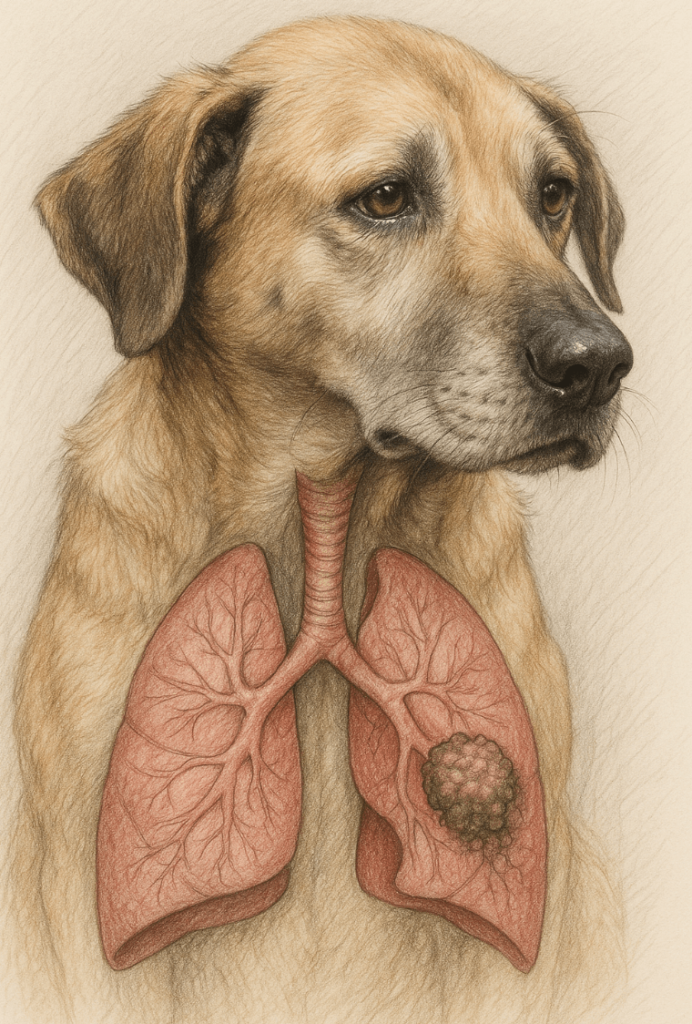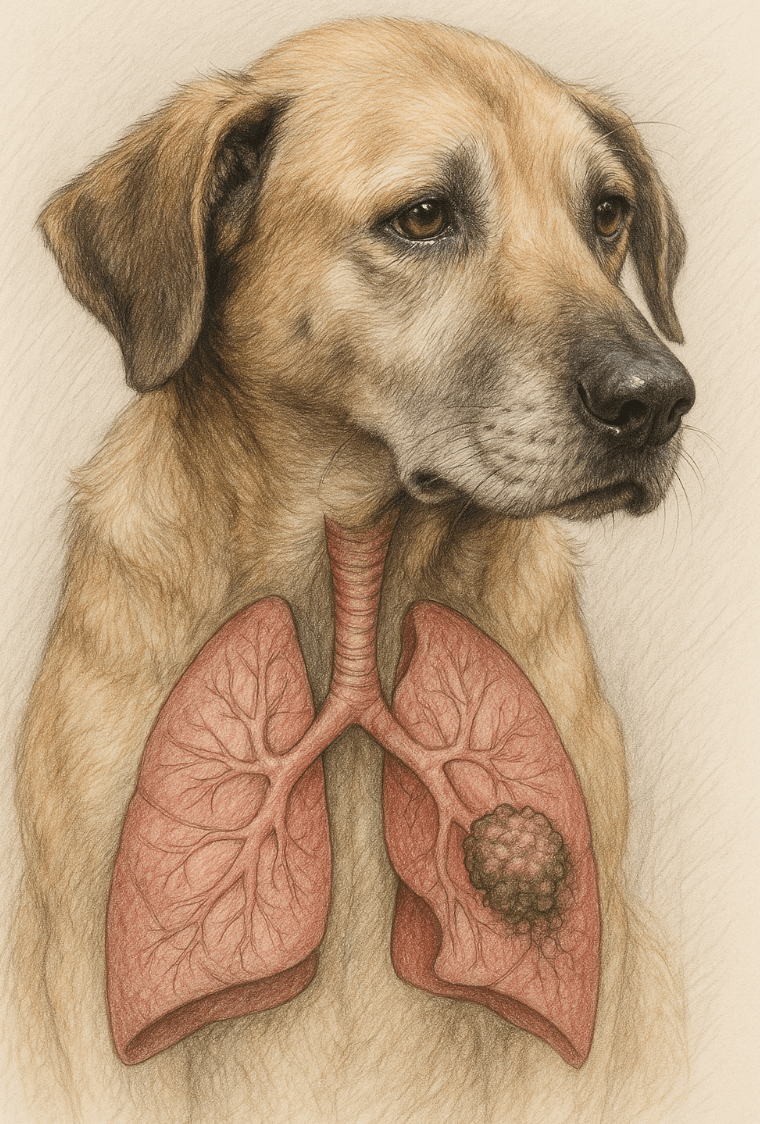Lung Cancer in Dogs: What Every Pet Owner Needs to Know
As a loving pet owner, the thought of your dog developing lung cancer can be overwhelming. While less common than other canine cancers, lung cancer is a serious condition that requires prompt attention and care. Early detection, understanding the symptoms, and exploring treatment options are crucial steps in ensuring your furry friend receives the best possible care. In this blog post, we’ll delve into the causes, signs, and management of lung cancer in dogs, equipping you with the knowledge to navigate this challenging diagnosis.
Expert Opinion on Lung Cancer in Dogs
“Lung cancer in dogs is a relatively rare type of cancer. When a dog has lung cancer, it means their lungs have been invaded by malignant tumors. Unlike benign (non-cancerous) tumors, malignant tumors can spread throughout the body, causing serious and potentially fatal health complications.”
Common Symptoms of Lung Cancer in Dogs
Recognizing the signs of lung cancer early can make a significant difference in your dog’s prognosis. These symptoms may vary depending on the type and stage of the disease but often include the following:
Persistent Coughing:
A chronic, dry cough is one of the most common indicators of lung cancer in dogs. It may worsen over time as the tumor grows.Difficulty Breathing:
Labored or rapid breathing, known as dyspnea, can signal that the lungs are struggling to function properly due to tumors or fluid buildup.Lethargy and Weakness:
Dogs with lung cancer often appear unusually tired or reluctant to engage in physical activities they once enjoyed.Weight Loss and Appetite Changes:
Unexplained weight loss or a sudden disinterest in food can be warning signs of an underlying health issue, including cancer.Coughing Up Blood:
Hemoptysis, or the presence of blood in mucus or saliva, is a severe symptom that requires immediate veterinary attention.
If your dog exhibits any of these symptoms, it’s essential to consult your veterinarian promptly for a thorough evaluation.

Causes and Risk Factors of Lung Cancer in Dogs
While the exact cause of lung cancer in dogs isn’t always clear, certain factors can increase the likelihood of its development. Understanding these risks can help you take preventive measures to protect your pet.
Environmental Toxins:
Exposure to secondhand smoke, air pollution, and household chemicals can elevate the risk of lung cancer in dogs.Age and Breed Predisposition:
Older dogs and certain breeds, such as Boxers and Doberman Pinschers, are more prone to developing lung cancer.Chronic Respiratory Issues:
Dogs with a history of respiratory infections or conditions like bronchitis may have a higher risk of developing lung tumors.Genetic Factors:
Some dogs may inherit a predisposition to cancer, making regular vet check-ups even more critical for at-risk breeds.Obesity and Poor Diet:
An unhealthy lifestyle can weaken a dog’s immune system, potentially increasing their vulnerability to cancer.
By addressing these risk factors, you can reduce your dog’s chances of developing lung cancer and promote overall well-being.
Check this guide 👉Anal Gland Cancer in Dogs: Best 7 Expert Tips!
Check this guide 👉Dog Kidney Cancer Symptoms: Best 7 Expert Tips!
Check this guide 👉Bladder Cancer in Dogs: Best 7 Expert Tips!
Diagnostic Tests for Lung Cancer | Treatment Options Available |
|---|---|
Chest X-rays | Surgery to remove tumors |
CT Scans | Chemotherapy to target cancer cells |
Biopsy of lung tissue | Radiation therapy for localized tumors |
Blood tests | Palliative care for symptom management |
Ultrasound imaging | Immunotherapy to boost the immune system |
Treatment Options for Dogs with Lung Cancer
The treatment plan for lung cancer depends on the type, stage, and overall health of your dog. While not all cases can be cured, several approaches can improve your dog’s quality of life.
Surgical Removal of Tumors:
If the cancer is localized and accessible, surgery may be performed to remove the tumor and affected tissue.Chemotherapy:
This systemic treatment targets cancer cells throughout the body and is often used when the cancer has spread beyond the lungs.Radiation Therapy:
Focused radiation can shrink tumors and alleviate symptoms, particularly in cases where surgery isn’t an option.Palliative Care:
For advanced cases, palliative treatments aim to manage pain and improve comfort rather than cure the disease.Immunotherapy:
Emerging therapies harness the dog’s immune system to fight cancer, offering hope for innovative treatment paths.
Each treatment has its benefits and challenges, so working closely with your veterinarian is key to finding the best approach for your dog.
How to Support Your Dog During Treatment
Supporting your dog through lung cancer treatment requires patience, compassion, and practical adjustments to their daily routine. Here are some ways to provide comfort and care during this difficult time.
Create a Calm Environment:
Minimize stress by keeping your home quiet and free from unnecessary disruptions that could overwhelm your dog.Monitor Their Appetite:
Encourage eating by offering small, frequent meals of high-quality, nutrient-rich food tailored to their needs.Provide Gentle Exercise:
Short walks or light play sessions can help maintain muscle tone without exhausting your dog.Stay Consistent with Medications:
Administer prescribed medications exactly as directed to ensure maximum effectiveness and minimize side effects.Offer Emotional Support:
Spend quality time with your dog, providing affection and reassurance to keep their spirits high.
By focusing on your dog’s emotional and physical needs, you can help them navigate treatment with dignity and comfort.
Tips for Preventing Lung Cancer in Dogs
While not all cases of lung cancer can be prevented, taking proactive steps can significantly reduce the risk. Here are some practical tips to safeguard your dog’s respiratory health.
Avoid Secondhand Smoke:
Keep your home smoke-free to protect your dog’s lungs from harmful carcinogens.Limit Exposure to Pollutants:
Reduce contact with pesticides, cleaning chemicals, and industrial pollutants that can harm your dog’s respiratory system.Maintain a Healthy Weight:
Obesity increases the risk of various health issues, including cancer. Ensure your dog stays active and eats a balanced diet.Schedule Regular Vet Visits:
Routine check-ups allow veterinarians to detect potential issues early, improving outcomes if cancer develops.Promote Fresh Air Environments:
Encourage outdoor play in clean, open spaces to support healthy lung function and overall vitality.
Prevention starts with small, consistent actions that prioritize your dog’s long-term health.
Understanding the Emotional Impact of Lung Cancer
A lung cancer diagnosis affects not only your dog but also your entire family. Acknowledging the emotional toll can help you cope during this challenging time.
Grieving Early Losses:
As treatments progress, you may mourn the loss of your dog’s former energy and vitality. Allow yourself to process these emotions.Seeking Support Networks:
Connect with online forums or local groups for pet owners facing similar challenges to share experiences and advice.Balancing Hope and Reality:
Stay hopeful about treatment outcomes while preparing for any eventuality to avoid feeling blindsided.Celebrating Small Wins:
Focus on moments of joy, whether it’s a good day for your dog or a successful treatment milestone.Prioritizing Self-Care:
Taking care of yourself ensures you have the strength and resilience to support your dog fully.
Emotional well-being is just as important as physical care when dealing with lung cancer.
Alternative Therapies for Managing Lung Cancer Symptoms
In addition to conventional treatments, alternative therapies can complement your dog’s care plan and enhance their comfort.
Acupuncture:
This ancient practice may help relieve pain and improve circulation, supporting overall wellness.Herbal Supplements:
Certain herbs, like turmeric and milk thistle, have anti-inflammatory properties that may benefit dogs with cancer.Massage Therapy:
Gentle massage can ease muscle tension, reduce anxiety, and promote relaxation in dogs undergoing treatment.Dietary Adjustments:
Incorporating omega-3 fatty acids and antioxidants can strengthen the immune system and combat inflammation.Hydrotherapy:
Low-impact water exercises can improve mobility and stamina without straining your dog’s body.
While these therapies should complement—not replace—traditional treatments, they offer holistic ways to improve your dog’s quality of life.
Frequently Asked Questions About Lung Cancer in Dogs
Is lung cancer common in dogs?
No, lung cancer accounts for only about 1% of all cancers in dogs, but it can be aggressive when it occurs.
Can lung cancer in dogs be cured?
Early-stage cases treated with surgery or other therapies may offer a chance for remission, but advanced cases focus on managing symptoms.
What breeds are most at risk?
Boxers, Doberman Pinschers, and Australian Shepherds are among the breeds with a higher predisposition to lung cancer.
How long can a dog live with lung cancer?
Life expectancy varies based on the type of cancer, treatment options, and overall health, ranging from months to years.
Are there ways to prevent lung cancer in dogs?
Reducing exposure to toxins, maintaining a healthy weight, and scheduling regular vet check-ups can lower the risk.
Empowering Yourself to Help Your Dog Through Lung Cancer
A lung cancer diagnosis is undoubtedly challenging, but arming yourself with knowledge and resources can make a world of difference for your dog. From recognizing symptoms early to exploring treatment options and providing unwavering support, every step you take contributes to your dog’s well-being. Remember, you’re not alone—veterinarians, specialists, and fellow pet owners are here to guide you through this journey. With love, care, and determination, you can give your beloved companion the best possible quality of life, no matter what lies ahead.
Do Cats Have Taste Buds? Best 7 Expert Tips! – Discover how cats experience flavors and why their taste is so unique.
Do Dogs Have Taste Buds? Best 7 Expert Tips! – Discover how dogs experience taste, their preferences, and what it means for their diet and health.
Can Cats Taste Sweet? Best 7 Expert Tips! – Discover why cats can’t taste sweetness, how it affects their diet, and tips to keep them healthy and happy.
Can Dogs Taste Sweet? Best 7 Expert Tips! – Discover how dogs perceive sweetness, which foods are safe, and tips to manage their sweet cravings responsibly.





